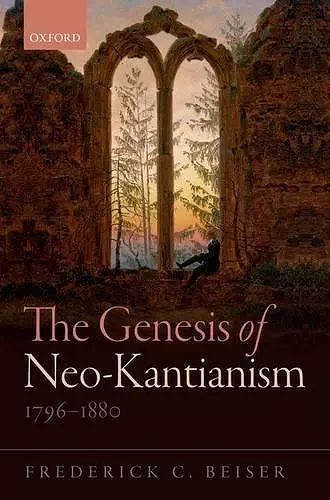The Genesis of Neo-Kantianism, 1796-1880
Format:Hardback
Publisher:Oxford University Press
Published:27th Nov '14
Currently unavailable, and unfortunately no date known when it will be back
This hardback is available in another edition too:
- Paperback£48.49(9780198769989)

Frederick C. Beiser tells the story of the emergence of neo-Kantianism from the late 1790s until the 1880s. He focuses on neo-Kantianism before official or familiar neo-Kantianism, i.e., before the formation of the various schools of neo-Kantianism in the 1880s and 1890s (which included the Marburg school, the Southwestern school, and the Göttingen school). Beiser argues that the source of neo-Kantianism lies in three crucial but neglected figures: Jakob Friedrich Fries, Johann Friedrich Herbart, and Friedrich Beneke, who together form what he calls 'the lost tradition'. They are the first neo-Kantians because they defended Kant's limits on knowledge against the excesses of speculative idealism, because they upheld Kant's dualisms against their many critics, and because they adhered to Kant's transcendental idealism. Much of The Genesis of Neo-Kantianism, 1796-1880 is devoted to an explanation for the rise of neo-Kantianism. Beiser contends that it became a greater force in the decades from 1840 to 1860 in response to three major developments in German culture: the collapse of speculative idealism; the materialism controversy; and the identity crisis of philosophy. As he goes on to argue, after the 1860s neo-Kantianism became a major philosophical force because of its response to two later cultural developments: the rise of pessimism and Darwinism.
The Genesis of Neo-Kantianism represents another important contribution from Beiser, whose numerous lengthy tomes have done much to illuminate our understanding of German philosophy in the 18th and 19th centuries. This illumination is particularly welcome in the case of NeoKantianism, which represents a largely untrodden area of inquiry in the English-speaking world * Evan Clarke, Philosophy in Review *
Neo-Kantianism is enjoying a renaissance in a number of areas. Continuing debates about the fate of Kantian philosophy will benefit greatly from the richness of Beiser's account. Zurück zu Neukantianismus! * M. Anthony Mills, The Review of Metaphysics *
Beiser has the ability to inhabit the philosophical perspective of each thinker to such a remarkable extent * Lydia Patton, Notre Dame Philosophical Reviews Online *
Recommended. * Choice *
Frederick Beiser's book is a valuable contribution to the revival of neo-Kantian studies characterizing the past few years: a trend that is blowing the dust off this important, yet hitherto neglected chapter of the history of philosophy. The quality of Beiser's writing is excellent throughout, showing mastery of an impressive range of sources and treating with equal competence a variety of topics in epistemology, metaphysics, ethics, and philosophy of religion. * Andrea Staiti, Journal of the History of Philosophy *
- Winner of Awarded the 2015 Journal of the History of Philosophy Book Prize.
ISBN: 9780198722205
Dimensions: 241mm x 164mm x 38mm
Weight: 1072g
626 pages